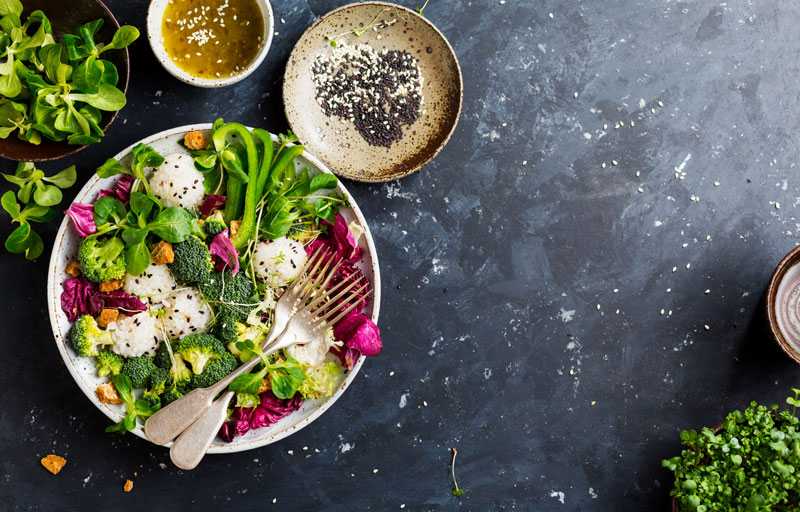Maybe you’ve heard that going vegan can help your hormones. Perhaps you are already vegan but are struggling with hormone issues. So what gives—can going vegan mess with your hormones, or can it help your hormones?!
The truth is that everyone is different, and different diets affect people differently. While bio-individuality should always be a focus, there are some things that a modern vegan diet gets wrong when it comes to happy, healthy hormone levels. In this article, we’re talking about how a vegan diet may negatively impact hormones. I’m also sharing strategies for vegans to help keep hormone levels in check. Let’s dive in.
Can Going Vegan Mess With Your Hormones?
Blood Sugar
One of the foundations of balanced hormones is balanced blood sugar. It’s essential to keep blood sugar levels stable to have stable hormone levels. If your blood sugars constantly spike and drop throughout the day, insulin is out of whack and overworked. Too much or too little insulin directly impacts the health of our sex and stress hormones.
For example, it is crucial for people who suffer from adrenal fatigue to keep blood sugar stable for healing. This means no fasting or skipping meals. It means consuming small, consistent meals throughout the day and always including healthy fat to help balance blood sugar.
How Can A Vegan Diet Affect My Blood Sugar?
For starters, a vegan diet often includes many carbohydrates like rice, potatoes, and chickpeas. If you’re not careful to balance carbs with protein, fiber, and fats, you’ll spike your blood sugar. Unfortunately, many of the vegan options on the market are seriously over-processed, which is horrible for balancing blood sugar.
Another roadblock you could come up against while being a vegan is the overconsumption of high sugar fruits like bananas. Don’t get me wrong—fruits are incredible sources of antioxidants, vitamins, minerals, and hydration. But when you dump a cup of apple juice or orange juice into a banana smoothie, your blood sugar is going to rise drastically. This isn’t to say that you can’t add wonderful plant-based sources of protein and fats to your smoothies like avocado and greens powder. But balancing your meals with fats, fiber, and protein is essential to keep blood sugar stable for happy, healthy hormones.
If your meals are out of balance and your blood sugar spikes, you’ll eventually be left feeling tired and craving quick-acting energy from poor food sources.
Thyroid
A healthy thyroid is key to healthy hormones, energy levels, and metabolism. When your thyroid needs some love, you may feel tired, cold, miss periods, have hair loss, dry skin, constipation, low mood, and weight issues. When the thyroid isn’t working correctly, you’ll see a rise in thyroid-stimulating hormone levels to try to overcompensate and pump out more thyroid hormones.
How does a vegan diet affect my thyroid?
To make T4 and T3 thyroid hormones, we need vitamin A, iodine, iron, selenium, tyrosine, zinc, and copper. Sluggish T4 to T3 conversion is also a risk for hypothyroidism. These nutrients are abundant in animal sources. Because they are a little harder to find in plant foods, going vegan and not getting a daily dose of these nutrients can negatively impact thyroid hormone production and health.
Protein
Protein is made up of building blocks called amino acids. Amino acids are responsible for tons of functions in the body and are often found in full range in animal proteins. It’s easier to get the essential amino acids from meat daily, although I have some good news for those who are vegan. But first, let’s talk about amino acids in hormone health.
How does a vegan diet impact amino acid intake?
We require amino acids for phase 1 liver detoxification. During this phase, the liver transforms hormones to get ready to excrete them and flush them from the body. A sluggish liver can put us at risk for estrogen dominance or a build-up of nasty toxins. Not only is it essential to get amino acids for liver function, but we also need them to support our gut lining. If we have a compromised gut lining, we can experience a lack in absorption and assimilation of nutrients. Not to mention it also stresses the body out and impacts neurotransmitters essential for a happy mood and a great memory.
Getting the full range of amino acids on a vegan diet is doable, but it requires slightly more planning and thought. For example, it’s not enough to have a portion of black beans. Back the good news I mentioned—our Organic Immunity Greens powder supplement contains spirulina and chlorella, supergreens that are complete proteins! This means that one scoop a day of our delicious apple-cinnamon powder in a smoothie or water covers your amino acids and makes hormones happy.
Fat
Vegan diets aren’t always low in fat. With crazy plant-based cheeses and pre-packaged foods on the market now, vegans are definitely getting their fair share of fatty foods. It’s good fats that we need to be focused on.
How does a vegan diet impact fat intake and hormones?
As we learned earlier, fat is essential for stable blood sugar. Cholesterol is actually a precursor for sex hormones. It makes sense why some naturopathic or women’s health doctors tell women who are trying to get pregnant to gain a little weight and add more fat into their diets.
If you are restricting fat in your vegan diet (or any way of eating for that matter), you may be suffering from low progesterone.
It’s time to add coconut yogurt, avocados, nuts, seeds, high-quality extra virgin olive oil to your diet. If you are vegetarian, grass-fed ghee and butter can also be great options. Avoid processed oils like canola, sunflower, and other vegetable oils, which are super inflammatory when heated. Consuming nutritious foods is one of the easiest and most effective ways to balance hormones. To learn more about fats’ role in healthy hormone levels, tune into our podcast episode, “Healthy Fats for Happy Hormones.”
Do Vegan Products Cause Estrogen Dominance?
One of the main concerns I have about going vegan is that some vegan products can disrupt hormones and specifically cause estrogen dominance. Soy is the most popular plant protein that vegans turn to. Processed soy products contain phytoestrogens, which mimic estrogen in the body, increasing estrogen levels. A hormone imbalance like this can lead to skin issues, hair fallout, irregular menstrual cycle, weight issues, fatigue, anxiety, depression, and more.
In today’s over-processed world, it’s hard to get away from hormone disruptors. These chemicals, or xenoestrogens, are found in conventional food (pesticides, fungicides, etc.), body care products, makeup, and even water. To reduce exposure, it’s important to buy organic whenever possible.
I hope this article helped you understand hormone balance in a new light and gave you some ideas for supporting healthy hormone levels through diet.









I was looking through some of your articles on this internet site and I believe this site is real informative ! Continue posting.